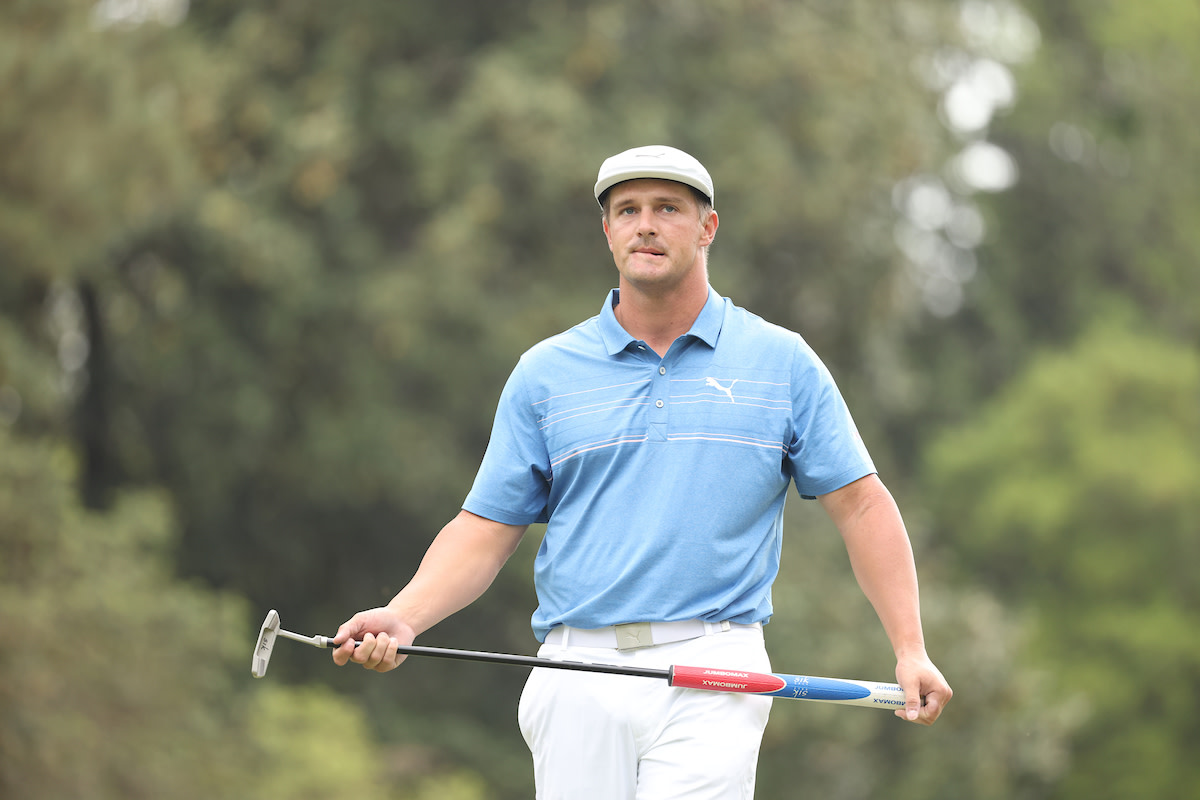
Augusta shows Bryson DeChambeau that it’s time to recalibrate
For the second time in five months, Bryson DeChambeau limped away from Augusta National, having been beaten up at a place that he thought he could outsmart or, at the very least, throw his weight around.
What DeChambeau must come to realize is that Augusta National isn’t a math equation. It’s a living, breathing thing, ripe with seemingly unending nuance and dominated by its moods, which are liable to be capricious at a moment’s notice. It can be welcoming, puzzling, demanding and even downright brutal – sometimes all in four days of the Masters.
To succeed there, one must be flexible, adaptable, nimble and most importantly, acutely aware of the surroundings – seen and unseen. A golfer isn't necessarily required to be fully in control of every facet of his game, as long as he has learned that he can’t bend Augusta National to the force of his will. Attempt to strong-arm the place and it will slap him away every time.
Last November, DeChambeau declared that Augusta National would be a par-67 for him, as he easily would hit all four of the par 5s in two and drive the green each day at the par-4 third. It sounded brash, perhaps even arrogant, although he didn’t appear to mean it that way. Still, words have consequences and DeChambeau’s came back to chew off a big hunk of his ego.
He shot 70-74-69-73 for a 2-under-par total of 286 and tie for 34th, 18 shots behind winner Dustin Johnson. It wasn’t one slice of humble pie; he was fed the whole thing. But to his everlasting credit, DeChambeau came back to the April Masters with some newfound realizations.
“I don't think you can ever figure this place out,” he said last Tuesday. “There's so many things going on around here. The wind makes it diabolical. It's flying around through these trees and bouncing off the trees and making it feel into the wind when it should be downwind, and vice versa. I don't think you'll ever be able to figure it out, but I've just got to be more comfortable.”
“I would say, for the most part, I think this golf course is an amazing and spectacular, challenging venue and championship. I think one of the most amazing things about this place is that it can turn on you real quick, when you least expect it.”
Last week, DeChambeau fought back from a first-round 76 with 5-under 67 on Friday to make the cut and start the weekend at 1-under, only six shots back of halfway leader Justin Rose, certainly plenty of time to make up that deficit. However, what he learned in the second round didn’t stick as a pair of 75s caused him to descend to T-46 for the tournament, his worst finish in five starts at Augusta.
DeChambeau felt a little naked and unarmed without a greens-reading book, which the Masters doesn’t allow, and the other tools he uses to try to mathematically dissect a course.
“It’s my biggest match, for sure,” he said. “Not having the help that sometimes I have on the golf course at other venues with greens books and not having the calibration tools that I usually use, it's definitely a test and something I'm willing to stand up to and try and face the challenge and try and conquer it.”
DeChambeau is all about testing the limits and pushing right to the edge. In his speed-training session at Augusta National last week, he reached well over 200-mph ball speed. It was so over the top that former Masters winner Vijay Singh, himself the ultimate range rat, stopped and watched, smiling and shaking his head in utter amazement.
However, DeChambeau found from painful experience that Augusta National doesn’t care about your ball speed. It’s only concerned with proper respect and applying lessons learned for the next time.
“Length is only as good as you can hit your next shot, is what I always say,” he said. “And that's the most important thing about Augusta National, is it doesn't test just the driving. It tests your second shots; it tests the third shot; it tests your 4-footer you're trying to make for par.”
DeChambeau withdrew from this week's RBC Heritage at Harbour Town on Hilton Head Island, S.C., a place so tightly enveloped, it feels as if the players have to walk single file down the fairways. The Pete Dye design probably is not the best place for his brand of smash ball.
However discouraged DeChambeau might have been leaving Augusta last Sunday, the likelihood is that his head won’t stay down long. He will turn his attention to the PGA Championship, which is next month at the Ocean Course on Kiawah Island, S.C., a seaside brute where the springtime wind can make an already difficult course seem like shooting pool without any rails.
In short order, he will be back in the laboratory and on the range, trying to work the next equation so that the answer makes sense to him – and perhaps no one else.
Sign up to receive the Morning Read newsletter, along with Where To Golf Next and The Equipment Insider.